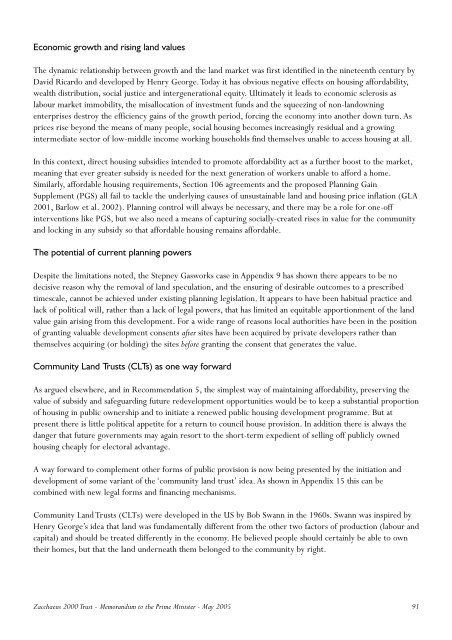Memorandum-to-the-Prime-Minister-on-Unaffordable-Housing
Memorandum-to-the-Prime-Minister-on-Unaffordable-Housing
Memorandum-to-the-Prime-Minister-on-Unaffordable-Housing
You also want an ePaper? Increase the reach of your titles
YUMPU automatically turns print PDFs into web optimized ePapers that Google loves.
Ec<strong>on</strong>omic growth and rising land values<br />
The dynamic relati<strong>on</strong>ship between growth and <str<strong>on</strong>g>the</str<strong>on</strong>g> land market was first identified in <str<strong>on</strong>g>the</str<strong>on</strong>g> nineteenth century by<br />
David Ricardo and developed by Henry George.Today it has obvious negative effects <strong>on</strong> housing affordability,<br />
wealth distributi<strong>on</strong>, social justice and intergenerati<strong>on</strong>al equity. Ultimately it leads <str<strong>on</strong>g>to</str<strong>on</strong>g> ec<strong>on</strong>omic sclerosis as<br />
labour market immobility, <str<strong>on</strong>g>the</str<strong>on</strong>g> misallocati<strong>on</strong> of investment funds and <str<strong>on</strong>g>the</str<strong>on</strong>g> squeezing of n<strong>on</strong>-landowning<br />
enterprises destroy <str<strong>on</strong>g>the</str<strong>on</strong>g> efficiency gains of <str<strong>on</strong>g>the</str<strong>on</strong>g> growth period, forcing <str<strong>on</strong>g>the</str<strong>on</strong>g> ec<strong>on</strong>omy in<str<strong>on</strong>g>to</str<strong>on</strong>g> ano<str<strong>on</strong>g>the</str<strong>on</strong>g>r down turn. As<br />
prices rise bey<strong>on</strong>d <str<strong>on</strong>g>the</str<strong>on</strong>g> means of many people, social housing becomes increasingly residual and a growing<br />
intermediate sec<str<strong>on</strong>g>to</str<strong>on</strong>g>r of low-middle income working households find <str<strong>on</strong>g>the</str<strong>on</strong>g>mselves unable <str<strong>on</strong>g>to</str<strong>on</strong>g> access housing at all.<br />
In this c<strong>on</strong>text, direct housing subsidies intended <str<strong>on</strong>g>to</str<strong>on</strong>g> promote affordability act as a fur<str<strong>on</strong>g>the</str<strong>on</strong>g>r boost <str<strong>on</strong>g>to</str<strong>on</strong>g> <str<strong>on</strong>g>the</str<strong>on</strong>g> market,<br />
meaning that ever greater subsidy is needed for <str<strong>on</strong>g>the</str<strong>on</strong>g> next generati<strong>on</strong> of workers unable <str<strong>on</strong>g>to</str<strong>on</strong>g> afford a home.<br />
Similarly, affordable housing requirements, Secti<strong>on</strong> 106 agreements and <str<strong>on</strong>g>the</str<strong>on</strong>g> proposed Planning Gain<br />
Supplement (PGS) all fail <str<strong>on</strong>g>to</str<strong>on</strong>g> tackle <str<strong>on</strong>g>the</str<strong>on</strong>g> underlying causes of unsustainable land and housing price inflati<strong>on</strong> (GLA<br />
2001, Barlow et al. 2002). Planning c<strong>on</strong>trol will always be necessary, and <str<strong>on</strong>g>the</str<strong>on</strong>g>re may be a role for <strong>on</strong>e-off<br />
interventi<strong>on</strong>s like PGS, but we also need a means of capturing socially-created rises in value for <str<strong>on</strong>g>the</str<strong>on</strong>g> community<br />
and locking in any subsidy so that affordable housing remains affordable.<br />
The potential of current planning powers<br />
Despite <str<strong>on</strong>g>the</str<strong>on</strong>g> limitati<strong>on</strong>s noted, <str<strong>on</strong>g>the</str<strong>on</strong>g> Stepney Gasworks case in Appendix 9 has shown <str<strong>on</strong>g>the</str<strong>on</strong>g>re appears <str<strong>on</strong>g>to</str<strong>on</strong>g> be no<br />
decisive reas<strong>on</strong> why <str<strong>on</strong>g>the</str<strong>on</strong>g> removal of land speculati<strong>on</strong>, and <str<strong>on</strong>g>the</str<strong>on</strong>g> ensuring of desirable outcomes <str<strong>on</strong>g>to</str<strong>on</strong>g> a prescribed<br />
timescale, cannot be achieved under existing planning legislati<strong>on</strong>. It appears <str<strong>on</strong>g>to</str<strong>on</strong>g> have been habitual practice and<br />
lack of political will, ra<str<strong>on</strong>g>the</str<strong>on</strong>g>r than a lack of legal powers, that has limited an equitable apporti<strong>on</strong>ment of <str<strong>on</strong>g>the</str<strong>on</strong>g> land<br />
value gain arising from this development. For a wide range of reas<strong>on</strong>s local authorities have been in <str<strong>on</strong>g>the</str<strong>on</strong>g> positi<strong>on</strong><br />
of granting valuable development c<strong>on</strong>sents after sites have been acquired by private developers ra<str<strong>on</strong>g>the</str<strong>on</strong>g>r than<br />
<str<strong>on</strong>g>the</str<strong>on</strong>g>mselves acquiring (or holding) <str<strong>on</strong>g>the</str<strong>on</strong>g> sites before granting <str<strong>on</strong>g>the</str<strong>on</strong>g> c<strong>on</strong>sent that generates <str<strong>on</strong>g>the</str<strong>on</strong>g> value.<br />
Community Land Trusts (CLTs) as <strong>on</strong>e way forward<br />
As argued elsewhere, and in Recommendati<strong>on</strong> 5, <str<strong>on</strong>g>the</str<strong>on</strong>g> simplest way of maintaining affordability, preserving <str<strong>on</strong>g>the</str<strong>on</strong>g><br />
value of subsidy and safeguarding future redevelopment opportunities would be <str<strong>on</strong>g>to</str<strong>on</strong>g> keep a substantial proporti<strong>on</strong><br />
of housing in public ownership and <str<strong>on</strong>g>to</str<strong>on</strong>g> initiate a renewed public housing development programme. But at<br />
present <str<strong>on</strong>g>the</str<strong>on</strong>g>re is little political appetite for a return <str<strong>on</strong>g>to</str<strong>on</strong>g> council house provisi<strong>on</strong>. In additi<strong>on</strong> <str<strong>on</strong>g>the</str<strong>on</strong>g>re is always <str<strong>on</strong>g>the</str<strong>on</strong>g><br />
danger that future governments may again resort <str<strong>on</strong>g>to</str<strong>on</strong>g> <str<strong>on</strong>g>the</str<strong>on</strong>g> short-term expedient of selling off publicly owned<br />
housing cheaply for elec<str<strong>on</strong>g>to</str<strong>on</strong>g>ral advantage.<br />
A way forward <str<strong>on</strong>g>to</str<strong>on</strong>g> complement o<str<strong>on</strong>g>the</str<strong>on</strong>g>r forms of public provisi<strong>on</strong> is now being presented by <str<strong>on</strong>g>the</str<strong>on</strong>g> initiati<strong>on</strong> and<br />
development of some variant of <str<strong>on</strong>g>the</str<strong>on</strong>g> ‘community land trust’ idea. As shown in Appendix 15 this can be<br />
combined with new legal forms and financing mechanisms.<br />
Community Land Trusts (CLTs) were developed in <str<strong>on</strong>g>the</str<strong>on</strong>g> US by Bob Swann in <str<strong>on</strong>g>the</str<strong>on</strong>g> 1960s. Swann was inspired by<br />
Henry George’s idea that land was fundamentally different from <str<strong>on</strong>g>the</str<strong>on</strong>g> o<str<strong>on</strong>g>the</str<strong>on</strong>g>r two fac<str<strong>on</strong>g>to</str<strong>on</strong>g>rs of producti<strong>on</strong> (labour and<br />
capital) and should be treated differently in <str<strong>on</strong>g>the</str<strong>on</strong>g> ec<strong>on</strong>omy. He believed people should certainly be able <str<strong>on</strong>g>to</str<strong>on</strong>g> own<br />
<str<strong>on</strong>g>the</str<strong>on</strong>g>ir homes, but that <str<strong>on</strong>g>the</str<strong>on</strong>g> land underneath <str<strong>on</strong>g>the</str<strong>on</strong>g>m bel<strong>on</strong>ged <str<strong>on</strong>g>to</str<strong>on</strong>g> <str<strong>on</strong>g>the</str<strong>on</strong>g> community by right.<br />
Zacchaeus 2000 Trust - <str<strong>on</strong>g>Memorandum</str<strong>on</strong>g> <str<strong>on</strong>g>to</str<strong>on</strong>g> <str<strong>on</strong>g>the</str<strong>on</strong>g> <str<strong>on</strong>g>Prime</str<strong>on</strong>g> <str<strong>on</strong>g>Minister</str<strong>on</strong>g> - May 2005 91


